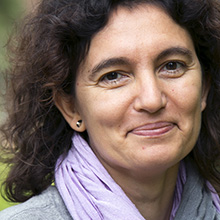Exercise Equations

- Duración
- 2012 - 2017
- Coordinador
- Judith Garcia Aymerich
- Financiadores
- SOCAP, SEPAR
The tests to assess exercise tolerance have gained importance in recent years. Among them, the six-minute walk test (6MWT) and the incremental shuttle walk test (ISWT) are widely used in clinical practice and research, specifically for patients with chronic respiratory disease such as COPD. However, the reference equations that are available in the literature for these tests can not be used in our setting because of differences in population characteristics, lifestyle and climatic conditions.
The present study aims at determining equations for the 6-minute walk and incremental shuttle walk tests for Spanish population.
The study design is cross-sectional, multicenter study involving 18 centers (hospitals and universities) across Spain. Included a sample of 573 healthy subjects from 45 to 85 years which perform the exercise tests. This sample was stratified by gender, geographical area and age group. Analyses were performed separately for men and women. We studied the factors associated with exercise capacity by linear regression, and obtain the coefficients and the percentage of explained variance.
The study subjects were 48% male and 52% female, mean (SD) age of 62 (11) years, height 164 (10) cm, weight 74 (13) kg and body mass index (BMI) 27 (4) kg/m2.
The resulting reference equations explained 42% (men) and 50% (women) of the variance in the distance walked in the 6MWT, and 53% of the variance in the distance walked in the ISWT.
The derived reference equations for the 6MWT:
for men, 6MWT = 478 - (5.51 x age) + (4.15 x heightcm) - (1.78 x weightkg) - (1.18 x HRbaseline*), and
for women, 6MWT = 1107 - (5.78 x age) - (1.48 x weightkg) - (1.27 x HRbaseline*).
The derived reference equations for the ISWT:
for men, ISWT = 838 - (11.3 x age) + (5.87 x heightcm) - (3.44 x weightkg) - (3.16 x HRbaseline*), and
for women, ISWT = 1291 - (9.66 x age) - (2.9 x weightkg).
The equations derived from this study are applicable to Spanish population to predict the distance walked in the 6MWT and ISWT.
Results of this study have been awarded the Excellence Grant in Clinical Physiology and Exercise at the European Respiratory Society meeting 2015.
Nuestro equipo
Principal Investigator (PI)
-
 Judith Garcia Aymerich Research Professor y directora del Programa de Medio ambiente y salud a lo largo de la vida
Judith Garcia Aymerich Research Professor y directora del Programa de Medio ambiente y salud a lo largo de la vida
Otros proyectos
Ver proyectos pasadosMCC-Spain
Estudio multi-caso control poblacional, incluyendo tumores de alta incidencia en España
Proyecto INMA - Infancia y Medio Ambiente
HELIX
Novel tools for integrating early-life environmental exposures and child health across Europe
EGG/EAGLE
Early Genetics Growth/Early Genetics and Lifecourse Epidemiology
PACE
Pregnancy and Childhood Epigenetics
LIFECYCLE
Early-life stressors and LifeCycle health
OMEGA-NET
Network on the Coordination and Harmonisation of European Occupational Cohorts
BiSC (Barcelona Life Study Cohort)
HARMONIC
Health effects of cArdiac fluoRoscopy and mOdern radIotherapy in paediatriCs
Mobilise-D
Connecting digital mobility assessment to clinical outcomes for regulatory and clinical endorsement
EARLY-ADAPT
Signs of Early Adaptation to Climate Change
COVICAT
Cohorte Covid-19 en Cataluña
ATHLETE
Advancing Tools for Human Early Lifecourse Exposome Research and Translation
CONTENT
Cohorte de COVID-19 en España: dinámica social, salud mental y desigualdades
EUCAN-Connect
A federated FAIR platform enabling large-scale analysis of high-value cohort data connecting Europe and Canada in personalized health
OBERON
An integrative strategy of testing systems for identification of EDs related to metabolic disorders
EXPANSE
EXposome Powered tools for healthy living in urbAN SEttings
AURORA 2021
Actionable eUropean ROadmap for early-life health Risk Assessment of micro- and nanoplastics
ONES
Fine Particle Matter, Fetal Growth, and Neurodevelopment: Examining Critical Windows of Susceptibility
AIR-NB
Pre-natal exposure to urban AIR pollution and pre- and post-Natal Brain development
El impacto de la exposición al metaboloma de esteroides materno-fetales en el crecimiento infantil y los resultados neurológicos (IGRO)
Project Code: PI21/01269
NutinBrain
The role of seafood and nut consumption on human neurodevelopment from pregnancy to adolescence
ALTER - Contaminación del aire, microbiota intestinal y neurodesarrollo en los primeros 24 meses de vida
Project Code: PI21/01278
Alimentación S2: por una dieta saludable y sostenible
Estudio sobre la exposición a nano y microplásticos a través del agua de consumo de Barcelona
¿Es mejor consumir el agua de grifo si queremos reducir la exposición a nano/micropláticos?
UrbanKids
Urban and social environment and childhood obesity – a natural moving2health experiment
Laboratorio Ciudadano de Salud Urbana
Planificación urbana, medio ambiente y salud
Characterizing Oral Exposure to Nanoplastics and Microplastics
Characterization of Oral NMP Exposure
iGenCO
In-Depth Genomics and Cross-Omics Analysis for Undiagnosed Rare Diseases on a User-Friendly Collaborative Platform
5G expOsure, causaL effects, and rIsk perception through citizen engAgemenT
GOLIAT
CityExposomeCat
An Exposome Approach to Urban Health: Individualized Environmental Exposure Assessment in an Adults Population Cohort Study (GCAT)
TwinAir
Digital Twins Enabled Indoor Air Quality Management for Healthy Living
Subclinical Infections in Children and Long Term Health Effects
Infection acquisition in early life and health outcomes in childhood - MARATO TV3
UBDPOLICY
The Urban Burden of Disease Estimation for POLICY Making
Exposición prenatal a sustancias poli y perfluoradas en agua de consumo y neurodesarrollo en el inicio de la vida
Project Code: PI20/00829
Base genética materna y fetal de la función placentaria
Project Code: PI20/01116
TOLIFE
Combining Artificial Intelligence and smart sensing TOward better management and improved quality of LIFE in chronic obstructive pulmonary disease
BWater
Drinking Water in Barcelona: Sustainability and Health Impact Assessment
CUPID
INTERCAMBIO
Interventions to promote mental and physical health in changing working environments due to climate change, sustainable work practices, and in green jobs
intoDBP
Innovative Tools to Control Organic Matter and Disinfection Byproducts in Drinking Water
FINDOOR
FTIR spectroscopy for real-time detection of bacterial outbreaks and the rapid identification of pathogenic serotypes, relapsing infections and antibiotic resistance
OccRF-Health
Occupational exposure to radiofrequency electromagnetic fields: From exposure assessment to study of health in workers and their offspring
EPHOR
Exposome Project for Health and Occupational Research
EXPONIT
Analysing and studying how night shift work affects workers' circadian rhythms and health



